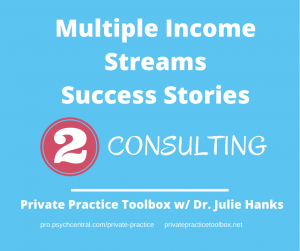 We are continuing our Success Stories of multiple income streams using the six areas I’ve previously highlighted: supervising, consulting, teaching, publishing, speaking, and writing.
Today we’re looking at number two on this list, Consulting. There are many ways a private practitioner can offer their knowledge for consulting purposes. These include: consulting with professionals, mental health agencies, corporate trainings, media contributing, and forensic consulting.
We are continuing our Success Stories of multiple income streams using the six areas I’ve previously highlighted: supervising, consulting, teaching, publishing, speaking, and writing.
Today we’re looking at number two on this list, Consulting. There are many ways a private practitioner can offer their knowledge for consulting purposes. These include: consulting with professionals, mental health agencies, corporate trainings, media contributing, and forensic consulting.
This success story is my own.
I love helping therapists create a practice that is energizing, fun, and profitable. After I had been in private practice for about 7 years and had grown from a solo to a private clinic, other private practitioners started asking me to share how I developed a clinic that didn’t rely on managed care, how to build a social media presence, and how to land media interviews. I started this blog Private Practice Toolbox on PsychCentral.com in July 2011 and started presenting on practice building strategies and began a consulting business Julie Hanks, LLC.
Here are a few questions to ask yourself if you'd like to add consulting as an additional income stream:
1) In what areas are other mental health professionals asking me for feedback, training, and information?
2) List 3 areas of expertise and professional passions. Which businesses, groups, or individuals people are looking for information related to my specialty area?
3) Which topics are you constantly researching, reading, and talking about simply because you enjoy learning more?
My hope is that these questions prompt you to brainstorm some ways that you could incorporate consulting into your professional life. If you are currently providing consulting, please let me know about it by posting about your consulting services! Feel free to add a link, too.
To learn more about my private practice consulting services visit PrivatePracticeToolbox.net
Get 52 FREE Mental Health Blog Prompts when you sign up for PPT list


As healers, we genuinely like to do our work. Guiding clients through the therapy process and seeing them make progress is why we do what we do. But if you're in private practice, you know there's a lot going on in the back end and that it's crucial to run an efficient and organized business.